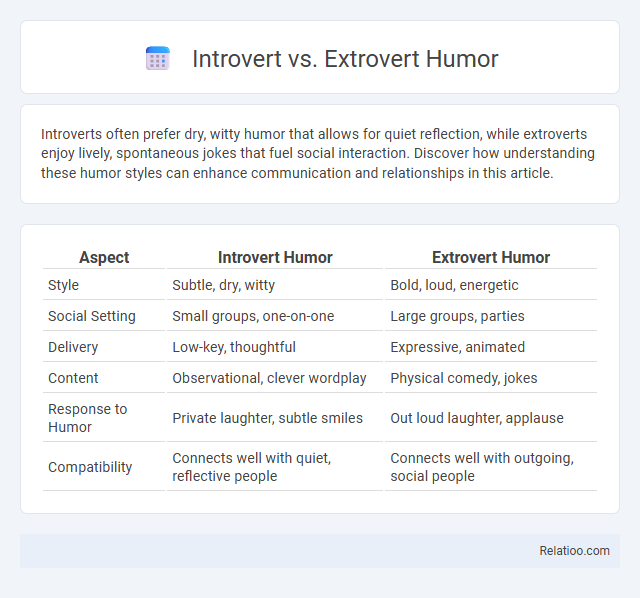Introverts often prefer dry, witty humor that allows for quiet reflection, while extroverts enjoy lively, spontaneous jokes that fuel social interaction. Discover how understanding these humor styles can enhance communication and relationships in this article.
Table of Comparison
| Aspect | Introvert Humor | Extrovert Humor |
|---|---|---|
| Style | Subtle, dry, witty | Bold, loud, energetic |
| Social Setting | Small groups, one-on-one | Large groups, parties |
| Delivery | Low-key, thoughtful | Expressive, animated |
| Content | Observational, clever wordplay | Physical comedy, jokes |
| Response to Humor | Private laughter, subtle smiles | Out loud laughter, applause |
| Compatibility | Connects well with quiet, reflective people | Connects well with outgoing, social people |
Understanding Introvert and Extrovert Humor
Introvert humor often leans towards dry wit, introspective jokes, and subtle sarcasm, reflecting a preference for thoughtful and nuanced communication. Extrovert humor tends to be more expressive, energetic, and social, with a focus on storytelling, physical comedy, and immediate audience engagement. Understanding introvert and extrovert humor highlights their distinct ways of processing and sharing amusement, rooted in their personality-driven communication styles.
The Psychology Behind How We Joke
The psychology behind humor reveals distinct patterns in introverts and extroverts, with introverts often preferring subtle, witty jokes and extroverts leaning towards expressive, energetic humor. Your sense of humor is influenced by underlying personality traits that affect how you process social cues and emotional content in jokes. Understanding these differences can enhance your social interactions by aligning your humor with your natural communication style.
Social Settings: The Playground for Humor
Introverts and extroverts engage with humor differently in social settings, shaping how laughter is shared and received. Extroverts often use humor as a tool to energize group dynamics and create a lively atmosphere, while introverts prefer subtle or dry wit, favoring meaningful connections over broad appeal. Your experience of humor in social settings will depend on how these personality traits influence communication styles and emotional responses during interactions.
Tone and Delivery: Quiet Wit vs. Loud Laughter
Introvert humor often relies on dry wit and subtlety, delivering punchlines with a calm, understated tone that invites you to engage thoughtfully. Extrovert humor uses loud laughter and energetic delivery, creating an infectious atmosphere that thrives on expressive gestures and vocal enthusiasm. Your appreciation of humor's impact can depend on how tone and delivery resonate, highlighting the dynamic contrast between quiet wit and spirited amusement.
Types of Jokes Preferred by Introverts
Introverts tend to prefer subtle, dry, and witty humor, often appreciating clever wordplay, irony, and observational jokes that require deeper thought. Unlike extroverts, who may enjoy loud, energetic, or slapstick comedy, introverts find humor that aligns with introspective and nuanced perspectives more engaging. Types of jokes favored by introverts typically include puns, dark humor, and self-deprecating jokes that resonate with their reflective nature.
Extrovert Humor: Outgoing and Energetic Styles
Extrovert humor is characterized by outgoing, energetic styles that thrive in social interactions and group settings, often involving physical comedy, loud jokes, and animated storytelling. This type of humor enhances social bonding and creates lively atmospheres, leveraging extroverts' natural expressiveness and confidence. In contrast to introvert humor, which tends to be subtle and introspective, extrovert humor relies heavily on external engagement and dynamic energy.
Common Misunderstandings and Stereotypes
Introvert and extrovert humor often face common misunderstandings, such as the stereotype that introverts lack a sense of humor or that extroverts are always outgoing and funny. Your unique style of humor may be misjudged due to these stereotypes, as introverts tend to use subtle, dry, or witty humor while extroverts often rely on expressive and spontaneous jokes. Understanding these differences helps break the misconception that one type of humor is superior or more genuine than the other.
Humor and Emotional Intelligence
Humor plays a crucial role in emotional intelligence by helping you navigate social interactions and manage emotions effectively. Introverts often use humor in a more subtle, reflective way, while extroverts tend to express humor outwardly to engage with others. Developing your ability to understand and use humor can enhance emotional insight and improve your interpersonal relationships.
How Humor Builds Connections Differently
Introvert humor often relies on subtlety, dry wit, and introspective reflection, creating connections through shared understanding and nuanced observations. Extrovert humor typically involves energetic storytelling, louder expressions, and social engagement, fostering instant rapport and group cohesion. Both styles effectively build relationships by resonating with distinct social dynamics and communication preferences.
Embracing Both: Blending Humor Styles
Embracing both introvert and extrovert humor styles allows you to create a dynamic blend that appeals to diverse social settings and personal preferences. Introvert humor often thrives on wit, subtlety, and introspective comedy, while extrovert humor is characterized by energetic, expressive, and interactive jokes. By combining these humor styles, you enhance your ability to connect with others authentically and diversify your comedic approach.

Infographic: Introvert vs Extrovert humor
 relatioo.com
relatioo.com